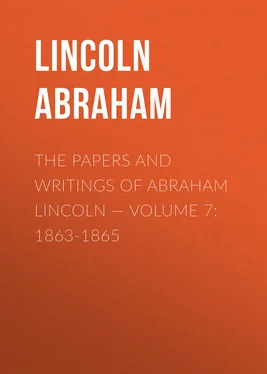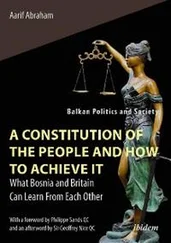Abraham Lincoln - The Papers And Writings Of Abraham Lincoln — Volume 7 - 1863-1865
Здесь есть возможность читать онлайн «Abraham Lincoln - The Papers And Writings Of Abraham Lincoln — Volume 7 - 1863-1865» — ознакомительный отрывок электронной книги совершенно бесплатно, а после прочтения отрывка купить полную версию. В некоторых случаях можно слушать аудио, скачать через торрент в формате fb2 и присутствует краткое содержание. Жанр: foreign_antique, foreign_prose, на английском языке. Описание произведения, (предисловие) а так же отзывы посетителей доступны на портале библиотеки ЛибКат.
- Название:The Papers And Writings Of Abraham Lincoln — Volume 7: 1863-1865
- Автор:
- Жанр:
- Год:неизвестен
- ISBN:нет данных
- Рейтинг книги:3 / 5. Голосов: 1
-
Избранное:Добавить в избранное
- Отзывы:
-
Ваша оценка:
- 60
- 1
- 2
- 3
- 4
- 5
The Papers And Writings Of Abraham Lincoln — Volume 7: 1863-1865: краткое содержание, описание и аннотация
Предлагаем к чтению аннотацию, описание, краткое содержание или предисловие (зависит от того, что написал сам автор книги «The Papers And Writings Of Abraham Lincoln — Volume 7: 1863-1865»). Если вы не нашли необходимую информацию о книге — напишите в комментариях, мы постараемся отыскать её.
The Papers And Writings Of Abraham Lincoln — Volume 7: 1863-1865 — читать онлайн ознакомительный отрывок
Ниже представлен текст книги, разбитый по страницам. Система сохранения места последней прочитанной страницы, позволяет с удобством читать онлайн бесплатно книгу «The Papers And Writings Of Abraham Lincoln — Volume 7: 1863-1865», без необходимости каждый раз заново искать на чём Вы остановились. Поставьте закладку, и сможете в любой момент перейти на страницу, на которой закончили чтение.
Интервал:
Закладка:
I invite your attention to the views of the Secretary as to the propriety of raising by appropriate legislation a revenue from the mineral lands of the United States.
The measures provided at your last session for the removal of certain Indian tribes have been carried into effect. Sundry treaties have been negotiated, which will in due time be submitted for the constitutional action of the Senate. They contain stipulations for extinguishing the possessory rights of the Indians to large and valuable tracts of lands. It is hoped that the effect of these treaties will result in the establishment of permanent friendly relations with such of these tribes as have been brought into frequent and bloody collision with our outlying settlements and emigrants. Sound policy and our imperative duty to these wards of the Government demand our anxious and constant attention to their material well-being, to their progress in the arts of civilization, and, above all, to that moral training which under the blessing of Divine Providence will confer upon them the elevated and sanctifying influences, the hopes and consolations, of the Christian faith.
I suggested in my last annual message the propriety of remodeling our Indian system. Subsequent events have satisfied me of its necessity. The details set forth in the report of the Secretary evince the urgent need for immediate legislative action.
I commend the benevolent institutions established or patronized by the Government in this District to your generous and fostering care.
The attention of Congress during the last session was engaged to some extent with a proposition for enlarging the water communication between the Mississippi River and the northeastern seaboard, which proposition, however, failed for the time. Since then, upon a call of the greatest respectability, a convention has been held at Chicago upon the same subject, a summary of whose views is contained in a memorial addressed to the President and Congress, and which I now have the honor to lay before you. That this interest is one which ere long will force its own way I do not entertain a doubt, while it is submitted entirely to your wisdom as to what can be done now. Augmented interest is given to this subject by the actual commencement of work upon the Pacific Railroad, under auspices so favorable to rapid progress and completion. The enlarged navigation becomes a palpable need to the great road.
I transmit the second annual report of the Commissioner of the Department of Agriculture, asking your attention to the developments in that vital interest of the nation.
When Congress assembled a year ago, the war had already lasted nearly twenty months, and there had been many conflicts on both land and sea, with varying results; the rebellion had been pressed back into reduced limits; yet the tone of public feeling and opinion, at home and abroad, was not satisfactory. With other signs, the popular elections then just past indicated uneasiness among ourselves, while, amid much that was cold and menacing, the kindest words coming from Europe were uttered in accents of pity that we are too blind to surrender a hopeless cause. Our commerce was suffering greatly by a few armed vessels built upon and furnished from foreign shores, and we were threatened with such additions from the same quarter as would sweep our trade from the sea and raise our blockade. We had failed to elicit from European governments anything hopeful upon this subject. The preliminary emancipation proclamation, issued in September, was running its assigned period to the beginning of the new year. A month later the final proclamation came, including the announcement that colored men of suitable condition would be received into the war service. The policy of emancipation and of employing black soldiers gave to the future a new aspect, about which hope and fear and doubt contended in uncertain conflict. According to our political system, as a matter of civil administration, the General Government had no lawful power to effect emancipation in any State, and for a long time it had been hoped that the rebellion could be suppressed without resorting to it as a military measure. It was all the while deemed possible that the necessity for it might come, and that if it should the crisis of the contest would then be presented. It came, and, as was anticipated, it was followed by dark and doubtful days. Eleven months having now passed, we are permitted to take another review. The rebel borders are pressed still farther back, and by the complete opening of the Mississippi the country dominated by the rebellion is divided into distinct parts, with no practical communication between them. Tennessee and Arkansas have been substantially cleared of insurgent control, and influential citizens in each, owners of slaves and advocates of slavery at the beginning of the rebellion, now declare openly for emancipation in their respective States. Of those States not included in the emancipation proclamation, Maryland and Missouri, neither of which three years ago would tolerate any restraint upon the extension of slavery into new Territories, dispute now only as to the best mode of removing it within their own limits.
Of those who were slaves at the beginning of the rebellion full 100,000 are now in the United States military service, about one-half of which number actually bear arms in the ranks, thus giving the double advantage of taking so much labor from the insurgent cause and supplying the places which otherwise must be filled with so many white men. So far as tested, it is difficult to say they are not as good soldiers as any. No servile insurrection or tendency to violence or cruelty has marked the measures of emancipation and arming the blacks. These measures have been much discussed in foreign countries, and, contemporary with such discussion, the tone of public sentiment there is much improved. At home the same measures have been fully discussed, supported, criticized, and denounced, and the annual elections following are highly encouraging to those whose official duty it is to bear the country through this great trial. Thus we have the new reckoning. The crisis which threatened to divide the friends of the Union is past.
Looking now to the present and future, and with reference to a resumption of the national authority within the States wherein that authority has been suspended, I have thought fit to issue a proclamation, a copy of which is herewith transmitted. On examination of this proclamation it will appear, as is believed, that nothing will be attempted beyond what is amply justified by the Constitution. True, the form of an oath is given, but no man is coerced to take it. The man is promised a pardon only in case he voluntarily takes the oath. The Constitution authorizes the Executive to grant or withhold the pardon at his own absolute discretion, and this includes the power to grant on terms, as is fully established by judicial and other authorities.
It is also proffered that if in any of the States named a State government shall be in the mode prescribed set up, such government shall be recognized and guaranteed by the United States, and that under it the State shall, on the constitutional conditions, be protected against invasion and domestic violence. The constitutional obligation of the United States to guarantee to every State in the Union a republican form of government and to protect the State in the cases stated is explicit and full. But why tender the benefits of this provision only to a State government set up in this particular way? This section of the Constitution contemplates a case wherein the element within a State favorable to republican government in the Union may be too feeble for an opposite and hostile element external to or even within the State, and such are precisely the cases with which we are now dealing.
An attempt to guarantee and protect a revived State government, constructed in whole or in preponderating part from the very element against whose hostility and violence it is to be protected, is simply absurd. There must be a test by which to separate the opposing elements, so as to build only from the sound; and that test is a sufficiently liberal one which accepts as sound whoever will make a sworn recantation of his former unsoundness.
Читать дальшеИнтервал:
Закладка:
Похожие книги на «The Papers And Writings Of Abraham Lincoln — Volume 7: 1863-1865»
Представляем Вашему вниманию похожие книги на «The Papers And Writings Of Abraham Lincoln — Volume 7: 1863-1865» списком для выбора. Мы отобрали схожую по названию и смыслу литературу в надежде предоставить читателям больше вариантов отыскать новые, интересные, ещё непрочитанные произведения.
Обсуждение, отзывы о книге «The Papers And Writings Of Abraham Lincoln — Volume 7: 1863-1865» и просто собственные мнения читателей. Оставьте ваши комментарии, напишите, что Вы думаете о произведении, его смысле или главных героях. Укажите что конкретно понравилось, а что нет, и почему Вы так считаете.












